Impact of COVID-19 on Consumer Behaviour in UK Luxury Hotels
VerifiedAdded on 2023/06/11
|12
|4329
|278
Report
AI Summary
This report provides an in-depth analysis of consumer behaviour within the luxury hotel sector, particularly focusing on the shifts and changes induced by the COVID-19 pandemic. It examines the impact of the pandemic on luxury hotels in the UK, highlighting challenges such as decreased tourism and the need for enhanced safety measures. The report applies the theory of planned behaviour to understand evolving consumer preferences and attitudes, covering factors like attitude, behavioural intention, subjective norms, social norms, perceived power, and perceived behavioural control. It also discusses how these factors influence consumer choices related to hygiene, safety, and overall service expectations. The study emphasizes the necessity for luxury hotels to adapt their strategies, incorporate technological advancements, and align with government guidelines to meet customer needs and maintain profitability in the post-pandemic environment. The analysis includes recommendations for marketing strategies that address the changing consumer behaviour to attract a larger customer base and ensure sustainable performance.
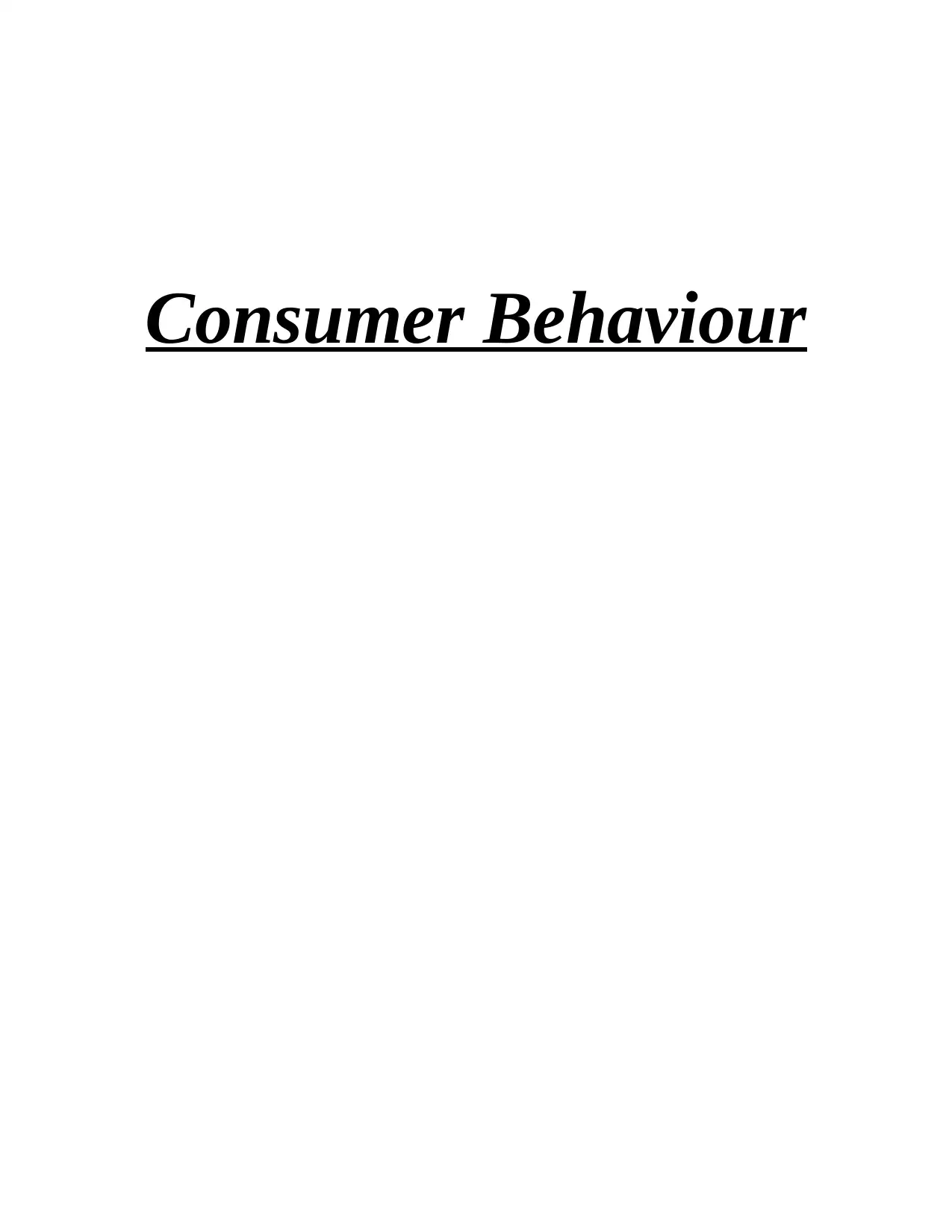
Consumer Behaviour
Paraphrase This Document
Need a fresh take? Get an instant paraphrase of this document with our AI Paraphraser
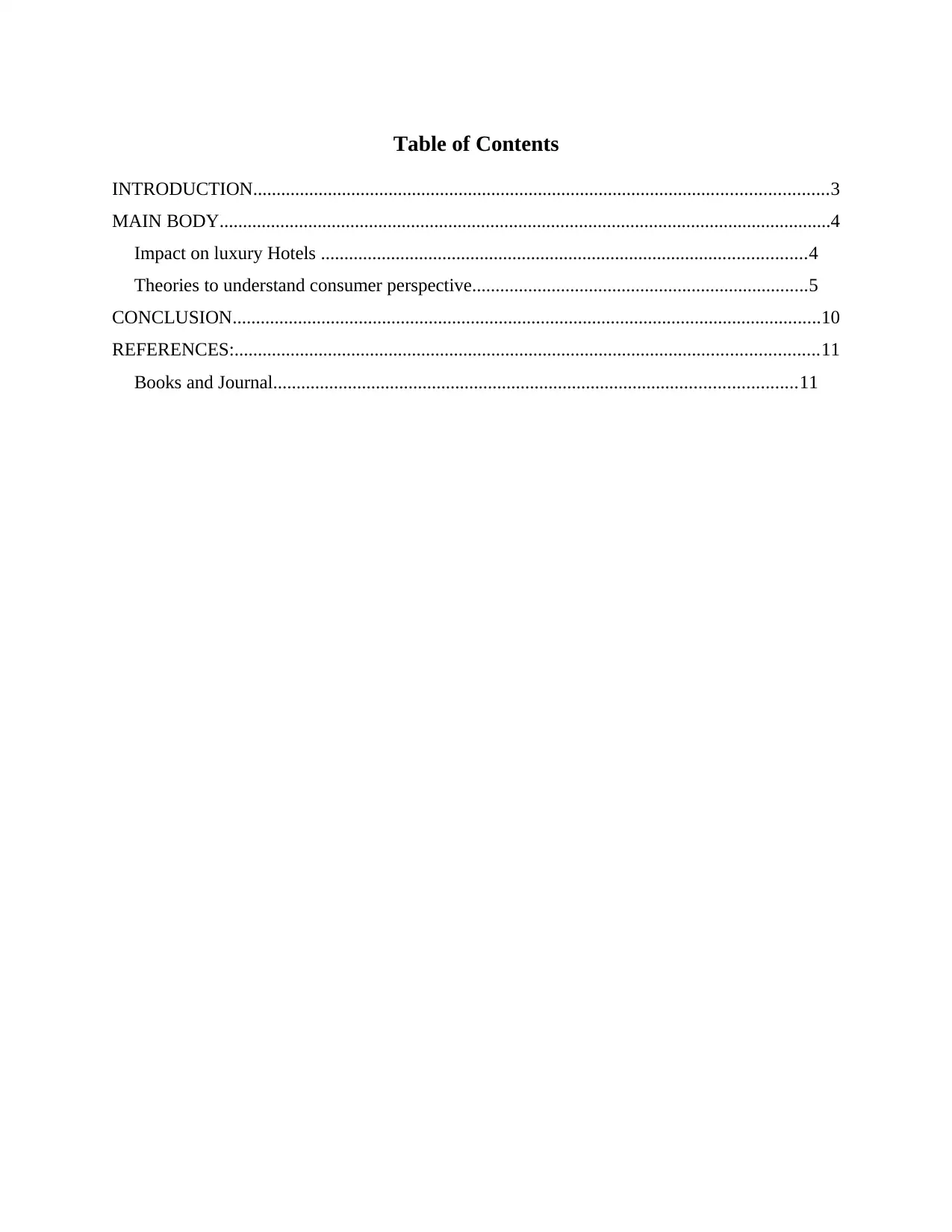
Table of Contents
INTRODUCTION...........................................................................................................................3
MAIN BODY...................................................................................................................................4
Impact on luxury Hotels ........................................................................................................4
Theories to understand consumer perspective........................................................................5
CONCLUSION..............................................................................................................................10
REFERENCES:.............................................................................................................................11
Books and Journal................................................................................................................11
INTRODUCTION...........................................................................................................................3
MAIN BODY...................................................................................................................................4
Impact on luxury Hotels ........................................................................................................4
Theories to understand consumer perspective........................................................................5
CONCLUSION..............................................................................................................................10
REFERENCES:.............................................................................................................................11
Books and Journal................................................................................................................11
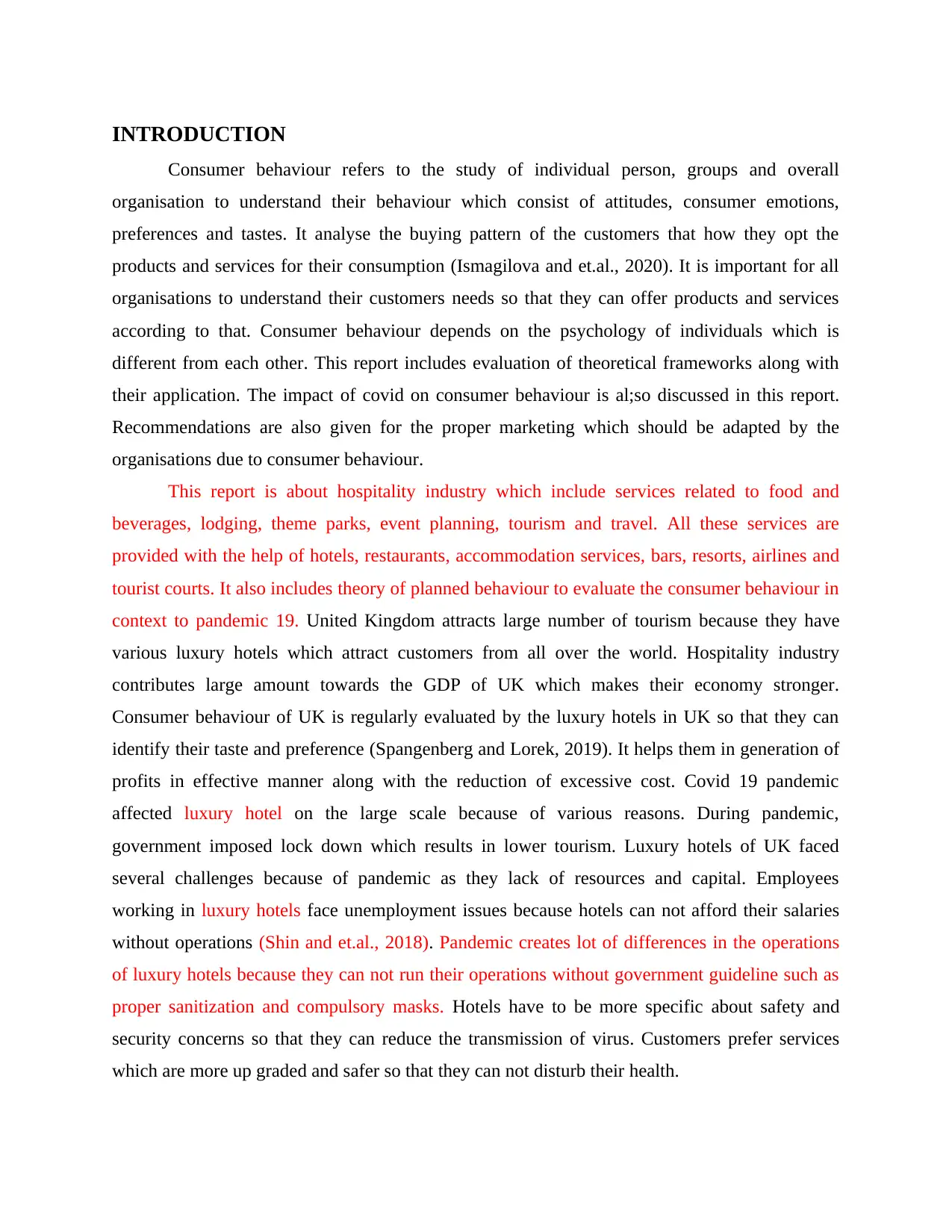
INTRODUCTION
Consumer behaviour refers to the study of individual person, groups and overall
organisation to understand their behaviour which consist of attitudes, consumer emotions,
preferences and tastes. It analyse the buying pattern of the customers that how they opt the
products and services for their consumption (Ismagilova and et.al., 2020). It is important for all
organisations to understand their customers needs so that they can offer products and services
according to that. Consumer behaviour depends on the psychology of individuals which is
different from each other. This report includes evaluation of theoretical frameworks along with
their application. The impact of covid on consumer behaviour is al;so discussed in this report.
Recommendations are also given for the proper marketing which should be adapted by the
organisations due to consumer behaviour.
This report is about hospitality industry which include services related to food and
beverages, lodging, theme parks, event planning, tourism and travel. All these services are
provided with the help of hotels, restaurants, accommodation services, bars, resorts, airlines and
tourist courts. It also includes theory of planned behaviour to evaluate the consumer behaviour in
context to pandemic 19. United Kingdom attracts large number of tourism because they have
various luxury hotels which attract customers from all over the world. Hospitality industry
contributes large amount towards the GDP of UK which makes their economy stronger.
Consumer behaviour of UK is regularly evaluated by the luxury hotels in UK so that they can
identify their taste and preference (Spangenberg and Lorek, 2019). It helps them in generation of
profits in effective manner along with the reduction of excessive cost. Covid 19 pandemic
affected luxury hotel on the large scale because of various reasons. During pandemic,
government imposed lock down which results in lower tourism. Luxury hotels of UK faced
several challenges because of pandemic as they lack of resources and capital. Employees
working in luxury hotels face unemployment issues because hotels can not afford their salaries
without operations (Shin and et.al., 2018). Pandemic creates lot of differences in the operations
of luxury hotels because they can not run their operations without government guideline such as
proper sanitization and compulsory masks. Hotels have to be more specific about safety and
security concerns so that they can reduce the transmission of virus. Customers prefer services
which are more up graded and safer so that they can not disturb their health.
Consumer behaviour refers to the study of individual person, groups and overall
organisation to understand their behaviour which consist of attitudes, consumer emotions,
preferences and tastes. It analyse the buying pattern of the customers that how they opt the
products and services for their consumption (Ismagilova and et.al., 2020). It is important for all
organisations to understand their customers needs so that they can offer products and services
according to that. Consumer behaviour depends on the psychology of individuals which is
different from each other. This report includes evaluation of theoretical frameworks along with
their application. The impact of covid on consumer behaviour is al;so discussed in this report.
Recommendations are also given for the proper marketing which should be adapted by the
organisations due to consumer behaviour.
This report is about hospitality industry which include services related to food and
beverages, lodging, theme parks, event planning, tourism and travel. All these services are
provided with the help of hotels, restaurants, accommodation services, bars, resorts, airlines and
tourist courts. It also includes theory of planned behaviour to evaluate the consumer behaviour in
context to pandemic 19. United Kingdom attracts large number of tourism because they have
various luxury hotels which attract customers from all over the world. Hospitality industry
contributes large amount towards the GDP of UK which makes their economy stronger.
Consumer behaviour of UK is regularly evaluated by the luxury hotels in UK so that they can
identify their taste and preference (Spangenberg and Lorek, 2019). It helps them in generation of
profits in effective manner along with the reduction of excessive cost. Covid 19 pandemic
affected luxury hotel on the large scale because of various reasons. During pandemic,
government imposed lock down which results in lower tourism. Luxury hotels of UK faced
several challenges because of pandemic as they lack of resources and capital. Employees
working in luxury hotels face unemployment issues because hotels can not afford their salaries
without operations (Shin and et.al., 2018). Pandemic creates lot of differences in the operations
of luxury hotels because they can not run their operations without government guideline such as
proper sanitization and compulsory masks. Hotels have to be more specific about safety and
security concerns so that they can reduce the transmission of virus. Customers prefer services
which are more up graded and safer so that they can not disturb their health.
⊘ This is a preview!⊘
Do you want full access?
Subscribe today to unlock all pages.

Trusted by 1+ million students worldwide
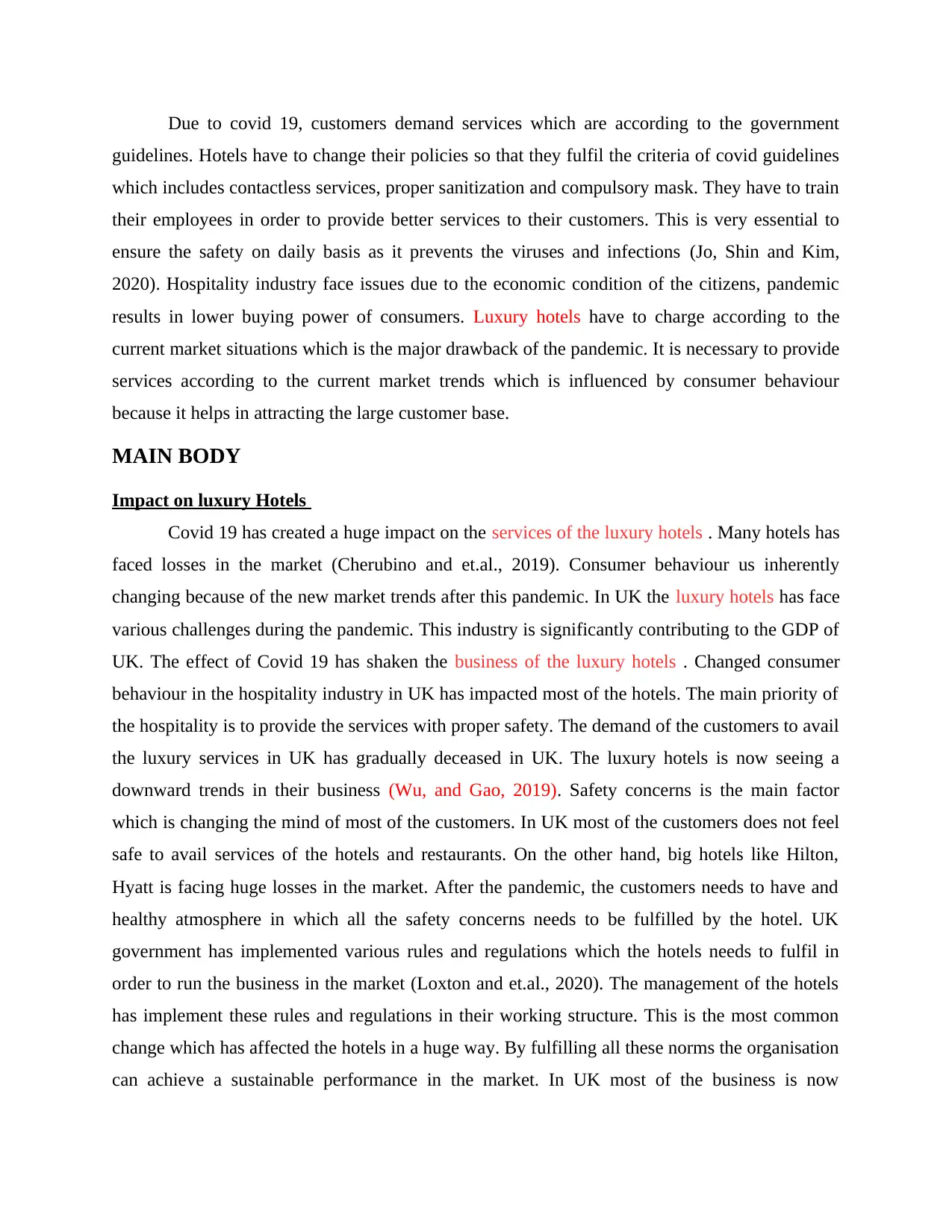
Due to covid 19, customers demand services which are according to the government
guidelines. Hotels have to change their policies so that they fulfil the criteria of covid guidelines
which includes contactless services, proper sanitization and compulsory mask. They have to train
their employees in order to provide better services to their customers. This is very essential to
ensure the safety on daily basis as it prevents the viruses and infections (Jo, Shin and Kim,
2020). Hospitality industry face issues due to the economic condition of the citizens, pandemic
results in lower buying power of consumers. Luxury hotels have to charge according to the
current market situations which is the major drawback of the pandemic. It is necessary to provide
services according to the current market trends which is influenced by consumer behaviour
because it helps in attracting the large customer base.
MAIN BODY
Impact on luxury Hotels
Covid 19 has created a huge impact on the services of the luxury hotels . Many hotels has
faced losses in the market (Cherubino and et.al., 2019). Consumer behaviour us inherently
changing because of the new market trends after this pandemic. In UK the luxury hotels has face
various challenges during the pandemic. This industry is significantly contributing to the GDP of
UK. The effect of Covid 19 has shaken the business of the luxury hotels . Changed consumer
behaviour in the hospitality industry in UK has impacted most of the hotels. The main priority of
the hospitality is to provide the services with proper safety. The demand of the customers to avail
the luxury services in UK has gradually deceased in UK. The luxury hotels is now seeing a
downward trends in their business (Wu, and Gao, 2019). Safety concerns is the main factor
which is changing the mind of most of the customers. In UK most of the customers does not feel
safe to avail services of the hotels and restaurants. On the other hand, big hotels like Hilton,
Hyatt is facing huge losses in the market. After the pandemic, the customers needs to have and
healthy atmosphere in which all the safety concerns needs to be fulfilled by the hotel. UK
government has implemented various rules and regulations which the hotels needs to fulfil in
order to run the business in the market (Loxton and et.al., 2020). The management of the hotels
has implement these rules and regulations in their working structure. This is the most common
change which has affected the hotels in a huge way. By fulfilling all these norms the organisation
can achieve a sustainable performance in the market. In UK most of the business is now
guidelines. Hotels have to change their policies so that they fulfil the criteria of covid guidelines
which includes contactless services, proper sanitization and compulsory mask. They have to train
their employees in order to provide better services to their customers. This is very essential to
ensure the safety on daily basis as it prevents the viruses and infections (Jo, Shin and Kim,
2020). Hospitality industry face issues due to the economic condition of the citizens, pandemic
results in lower buying power of consumers. Luxury hotels have to charge according to the
current market situations which is the major drawback of the pandemic. It is necessary to provide
services according to the current market trends which is influenced by consumer behaviour
because it helps in attracting the large customer base.
MAIN BODY
Impact on luxury Hotels
Covid 19 has created a huge impact on the services of the luxury hotels . Many hotels has
faced losses in the market (Cherubino and et.al., 2019). Consumer behaviour us inherently
changing because of the new market trends after this pandemic. In UK the luxury hotels has face
various challenges during the pandemic. This industry is significantly contributing to the GDP of
UK. The effect of Covid 19 has shaken the business of the luxury hotels . Changed consumer
behaviour in the hospitality industry in UK has impacted most of the hotels. The main priority of
the hospitality is to provide the services with proper safety. The demand of the customers to avail
the luxury services in UK has gradually deceased in UK. The luxury hotels is now seeing a
downward trends in their business (Wu, and Gao, 2019). Safety concerns is the main factor
which is changing the mind of most of the customers. In UK most of the customers does not feel
safe to avail services of the hotels and restaurants. On the other hand, big hotels like Hilton,
Hyatt is facing huge losses in the market. After the pandemic, the customers needs to have and
healthy atmosphere in which all the safety concerns needs to be fulfilled by the hotel. UK
government has implemented various rules and regulations which the hotels needs to fulfil in
order to run the business in the market (Loxton and et.al., 2020). The management of the hotels
has implement these rules and regulations in their working structure. This is the most common
change which has affected the hotels in a huge way. By fulfilling all these norms the organisation
can achieve a sustainable performance in the market. In UK most of the business is now
Paraphrase This Document
Need a fresh take? Get an instant paraphrase of this document with our AI Paraphraser
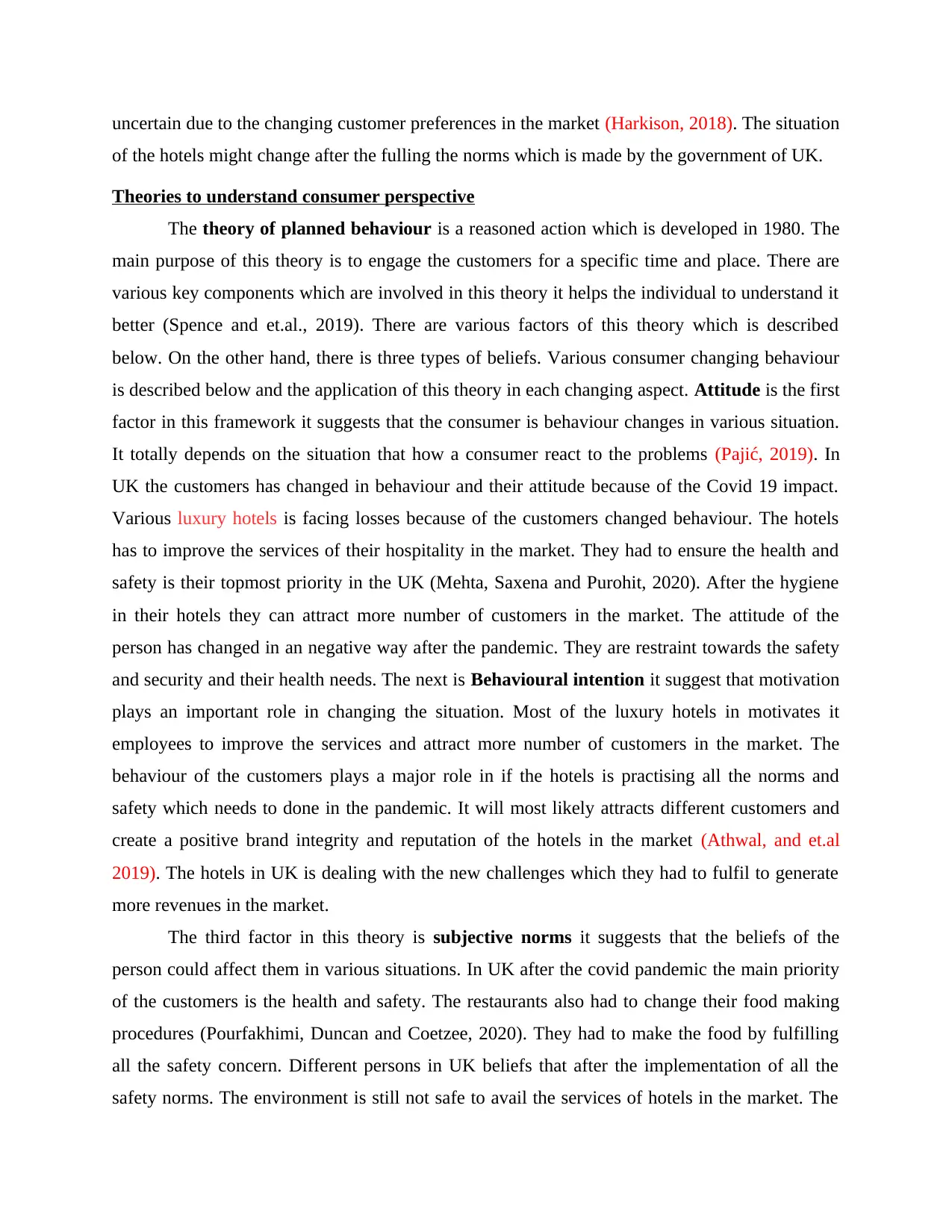
uncertain due to the changing customer preferences in the market (Harkison, 2018). The situation
of the hotels might change after the fulling the norms which is made by the government of UK.
Theories to understand consumer perspective
The theory of planned behaviour is a reasoned action which is developed in 1980. The
main purpose of this theory is to engage the customers for a specific time and place. There are
various key components which are involved in this theory it helps the individual to understand it
better (Spence and et.al., 2019). There are various factors of this theory which is described
below. On the other hand, there is three types of beliefs. Various consumer changing behaviour
is described below and the application of this theory in each changing aspect. Attitude is the first
factor in this framework it suggests that the consumer is behaviour changes in various situation.
It totally depends on the situation that how a consumer react to the problems (Pajić, 2019). In
UK the customers has changed in behaviour and their attitude because of the Covid 19 impact.
Various luxury hotels is facing losses because of the customers changed behaviour. The hotels
has to improve the services of their hospitality in the market. They had to ensure the health and
safety is their topmost priority in the UK (Mehta, Saxena and Purohit, 2020). After the hygiene
in their hotels they can attract more number of customers in the market. The attitude of the
person has changed in an negative way after the pandemic. They are restraint towards the safety
and security and their health needs. The next is Behavioural intention it suggest that motivation
plays an important role in changing the situation. Most of the luxury hotels in motivates it
employees to improve the services and attract more number of customers in the market. The
behaviour of the customers plays a major role in if the hotels is practising all the norms and
safety which needs to done in the pandemic. It will most likely attracts different customers and
create a positive brand integrity and reputation of the hotels in the market (Athwal, and et.al
2019). The hotels in UK is dealing with the new challenges which they had to fulfil to generate
more revenues in the market.
The third factor in this theory is subjective norms it suggests that the beliefs of the
person could affect them in various situations. In UK after the covid pandemic the main priority
of the customers is the health and safety. The restaurants also had to change their food making
procedures (Pourfakhimi, Duncan and Coetzee, 2020). They had to make the food by fulfilling
all the safety concern. Different persons in UK beliefs that after the implementation of all the
safety norms. The environment is still not safe to avail the services of hotels in the market. The
of the hotels might change after the fulling the norms which is made by the government of UK.
Theories to understand consumer perspective
The theory of planned behaviour is a reasoned action which is developed in 1980. The
main purpose of this theory is to engage the customers for a specific time and place. There are
various key components which are involved in this theory it helps the individual to understand it
better (Spence and et.al., 2019). There are various factors of this theory which is described
below. On the other hand, there is three types of beliefs. Various consumer changing behaviour
is described below and the application of this theory in each changing aspect. Attitude is the first
factor in this framework it suggests that the consumer is behaviour changes in various situation.
It totally depends on the situation that how a consumer react to the problems (Pajić, 2019). In
UK the customers has changed in behaviour and their attitude because of the Covid 19 impact.
Various luxury hotels is facing losses because of the customers changed behaviour. The hotels
has to improve the services of their hospitality in the market. They had to ensure the health and
safety is their topmost priority in the UK (Mehta, Saxena and Purohit, 2020). After the hygiene
in their hotels they can attract more number of customers in the market. The attitude of the
person has changed in an negative way after the pandemic. They are restraint towards the safety
and security and their health needs. The next is Behavioural intention it suggest that motivation
plays an important role in changing the situation. Most of the luxury hotels in motivates it
employees to improve the services and attract more number of customers in the market. The
behaviour of the customers plays a major role in if the hotels is practising all the norms and
safety which needs to done in the pandemic. It will most likely attracts different customers and
create a positive brand integrity and reputation of the hotels in the market (Athwal, and et.al
2019). The hotels in UK is dealing with the new challenges which they had to fulfil to generate
more revenues in the market.
The third factor in this theory is subjective norms it suggests that the beliefs of the
person could affect them in various situations. In UK after the covid pandemic the main priority
of the customers is the health and safety. The restaurants also had to change their food making
procedures (Pourfakhimi, Duncan and Coetzee, 2020). They had to make the food by fulfilling
all the safety concern. Different persons in UK beliefs that after the implementation of all the
safety norms. The environment is still not safe to avail the services of hotels in the market. The
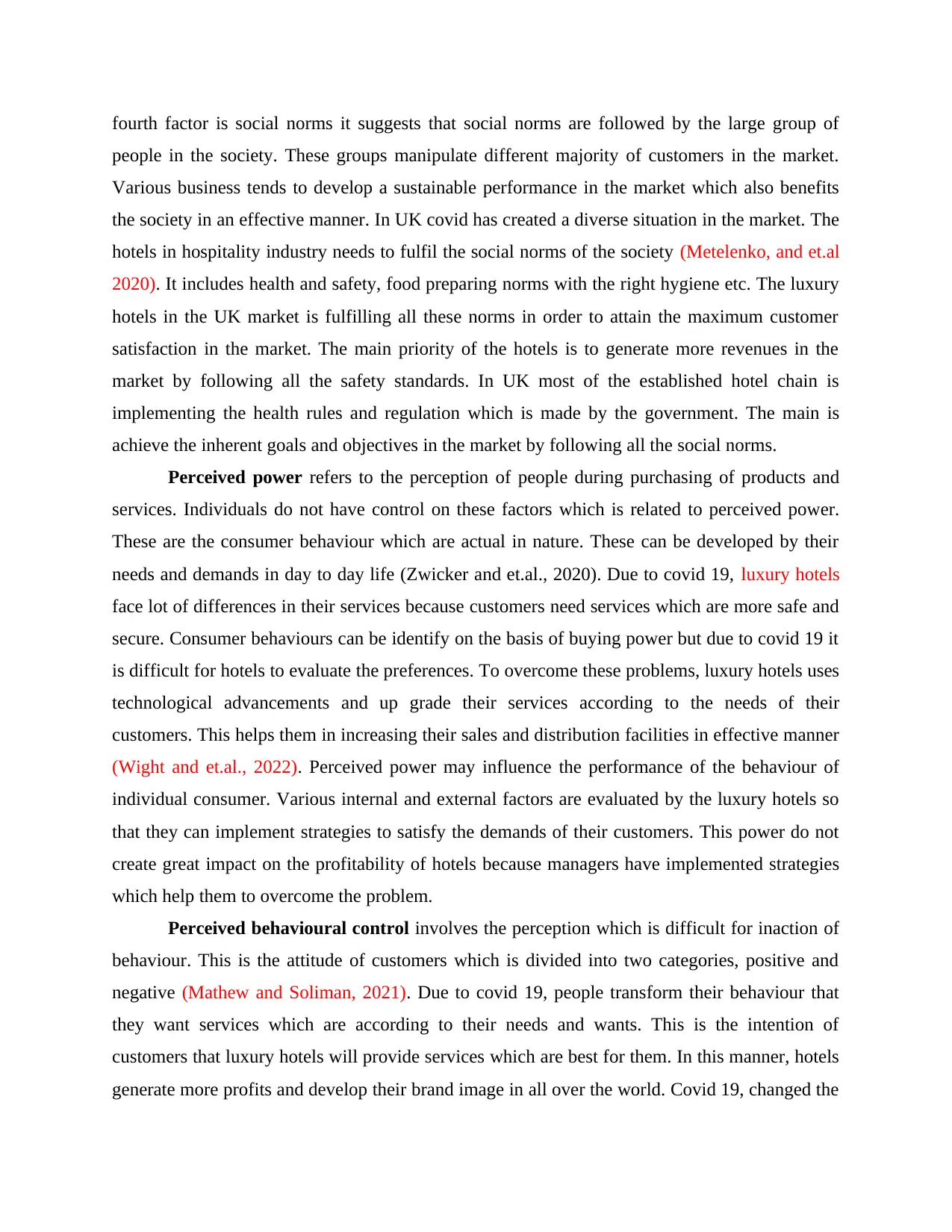
fourth factor is social norms it suggests that social norms are followed by the large group of
people in the society. These groups manipulate different majority of customers in the market.
Various business tends to develop a sustainable performance in the market which also benefits
the society in an effective manner. In UK covid has created a diverse situation in the market. The
hotels in hospitality industry needs to fulfil the social norms of the society (Metelenko, and et.al
2020). It includes health and safety, food preparing norms with the right hygiene etc. The luxury
hotels in the UK market is fulfilling all these norms in order to attain the maximum customer
satisfaction in the market. The main priority of the hotels is to generate more revenues in the
market by following all the safety standards. In UK most of the established hotel chain is
implementing the health rules and regulation which is made by the government. The main is
achieve the inherent goals and objectives in the market by following all the social norms.
Perceived power refers to the perception of people during purchasing of products and
services. Individuals do not have control on these factors which is related to perceived power.
These are the consumer behaviour which are actual in nature. These can be developed by their
needs and demands in day to day life (Zwicker and et.al., 2020). Due to covid 19, luxury hotels
face lot of differences in their services because customers need services which are more safe and
secure. Consumer behaviours can be identify on the basis of buying power but due to covid 19 it
is difficult for hotels to evaluate the preferences. To overcome these problems, luxury hotels uses
technological advancements and up grade their services according to the needs of their
customers. This helps them in increasing their sales and distribution facilities in effective manner
(Wight and et.al., 2022). Perceived power may influence the performance of the behaviour of
individual consumer. Various internal and external factors are evaluated by the luxury hotels so
that they can implement strategies to satisfy the demands of their customers. This power do not
create great impact on the profitability of hotels because managers have implemented strategies
which help them to overcome the problem.
Perceived behavioural control involves the perception which is difficult for inaction of
behaviour. This is the attitude of customers which is divided into two categories, positive and
negative (Mathew and Soliman, 2021). Due to covid 19, people transform their behaviour that
they want services which are according to their needs and wants. This is the intention of
customers that luxury hotels will provide services which are best for them. In this manner, hotels
generate more profits and develop their brand image in all over the world. Covid 19, changed the
people in the society. These groups manipulate different majority of customers in the market.
Various business tends to develop a sustainable performance in the market which also benefits
the society in an effective manner. In UK covid has created a diverse situation in the market. The
hotels in hospitality industry needs to fulfil the social norms of the society (Metelenko, and et.al
2020). It includes health and safety, food preparing norms with the right hygiene etc. The luxury
hotels in the UK market is fulfilling all these norms in order to attain the maximum customer
satisfaction in the market. The main priority of the hotels is to generate more revenues in the
market by following all the safety standards. In UK most of the established hotel chain is
implementing the health rules and regulation which is made by the government. The main is
achieve the inherent goals and objectives in the market by following all the social norms.
Perceived power refers to the perception of people during purchasing of products and
services. Individuals do not have control on these factors which is related to perceived power.
These are the consumer behaviour which are actual in nature. These can be developed by their
needs and demands in day to day life (Zwicker and et.al., 2020). Due to covid 19, luxury hotels
face lot of differences in their services because customers need services which are more safe and
secure. Consumer behaviours can be identify on the basis of buying power but due to covid 19 it
is difficult for hotels to evaluate the preferences. To overcome these problems, luxury hotels uses
technological advancements and up grade their services according to the needs of their
customers. This helps them in increasing their sales and distribution facilities in effective manner
(Wight and et.al., 2022). Perceived power may influence the performance of the behaviour of
individual consumer. Various internal and external factors are evaluated by the luxury hotels so
that they can implement strategies to satisfy the demands of their customers. This power do not
create great impact on the profitability of hotels because managers have implemented strategies
which help them to overcome the problem.
Perceived behavioural control involves the perception which is difficult for inaction of
behaviour. This is the attitude of customers which is divided into two categories, positive and
negative (Mathew and Soliman, 2021). Due to covid 19, people transform their behaviour that
they want services which are according to their needs and wants. This is the intention of
customers that luxury hotels will provide services which are best for them. In this manner, hotels
generate more profits and develop their brand image in all over the world. Covid 19, changed the
⊘ This is a preview!⊘
Do you want full access?
Subscribe today to unlock all pages.

Trusted by 1+ million students worldwide
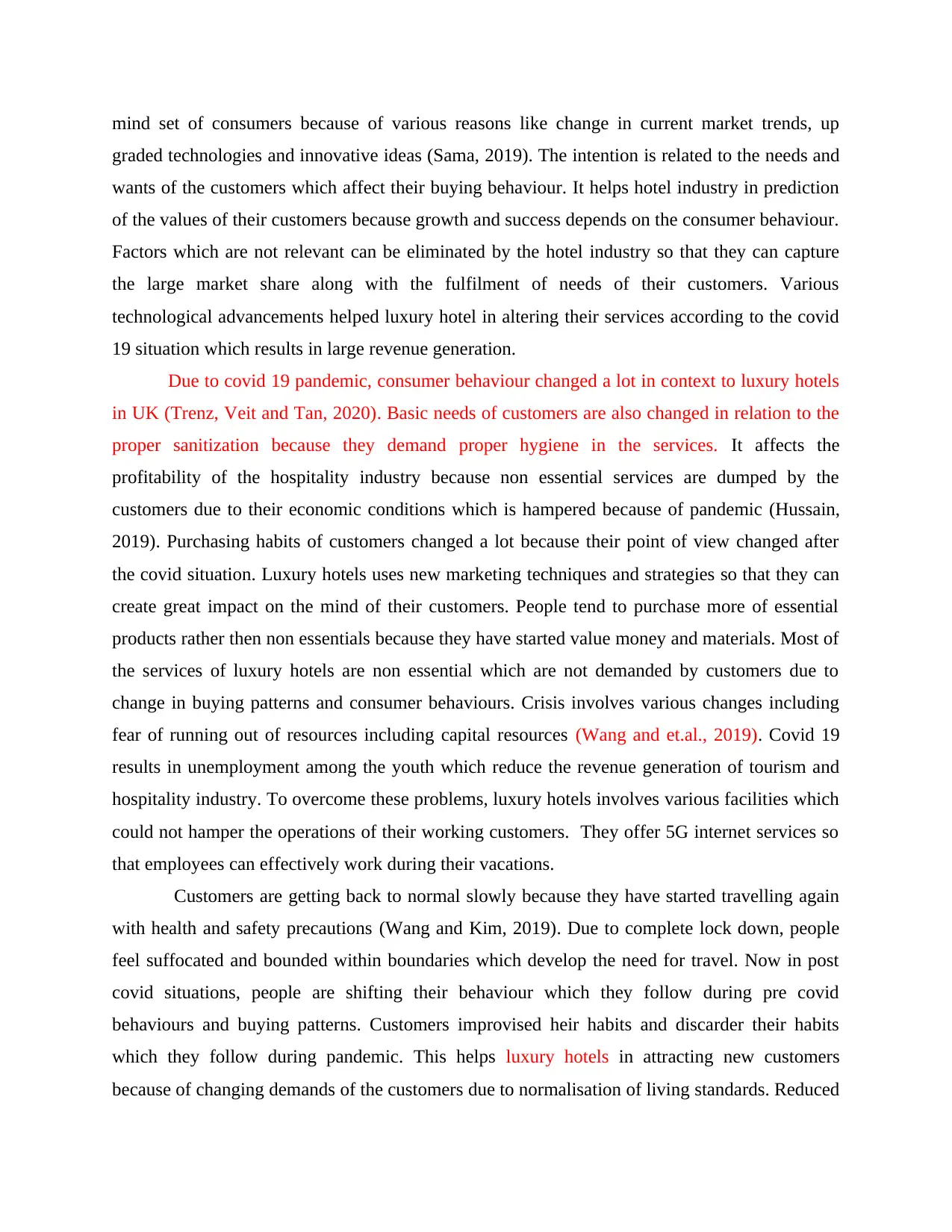
mind set of consumers because of various reasons like change in current market trends, up
graded technologies and innovative ideas (Sama, 2019). The intention is related to the needs and
wants of the customers which affect their buying behaviour. It helps hotel industry in prediction
of the values of their customers because growth and success depends on the consumer behaviour.
Factors which are not relevant can be eliminated by the hotel industry so that they can capture
the large market share along with the fulfilment of needs of their customers. Various
technological advancements helped luxury hotel in altering their services according to the covid
19 situation which results in large revenue generation.
Due to covid 19 pandemic, consumer behaviour changed a lot in context to luxury hotels
in UK (Trenz, Veit and Tan, 2020). Basic needs of customers are also changed in relation to the
proper sanitization because they demand proper hygiene in the services. It affects the
profitability of the hospitality industry because non essential services are dumped by the
customers due to their economic conditions which is hampered because of pandemic (Hussain,
2019). Purchasing habits of customers changed a lot because their point of view changed after
the covid situation. Luxury hotels uses new marketing techniques and strategies so that they can
create great impact on the mind of their customers. People tend to purchase more of essential
products rather then non essentials because they have started value money and materials. Most of
the services of luxury hotels are non essential which are not demanded by customers due to
change in buying patterns and consumer behaviours. Crisis involves various changes including
fear of running out of resources including capital resources (Wang and et.al., 2019). Covid 19
results in unemployment among the youth which reduce the revenue generation of tourism and
hospitality industry. To overcome these problems, luxury hotels involves various facilities which
could not hamper the operations of their working customers. They offer 5G internet services so
that employees can effectively work during their vacations.
Customers are getting back to normal slowly because they have started travelling again
with health and safety precautions (Wang and Kim, 2019). Due to complete lock down, people
feel suffocated and bounded within boundaries which develop the need for travel. Now in post
covid situations, people are shifting their behaviour which they follow during pre covid
behaviours and buying patterns. Customers improvised heir habits and discarder their habits
which they follow during pandemic. This helps luxury hotels in attracting new customers
because of changing demands of the customers due to normalisation of living standards. Reduced
graded technologies and innovative ideas (Sama, 2019). The intention is related to the needs and
wants of the customers which affect their buying behaviour. It helps hotel industry in prediction
of the values of their customers because growth and success depends on the consumer behaviour.
Factors which are not relevant can be eliminated by the hotel industry so that they can capture
the large market share along with the fulfilment of needs of their customers. Various
technological advancements helped luxury hotel in altering their services according to the covid
19 situation which results in large revenue generation.
Due to covid 19 pandemic, consumer behaviour changed a lot in context to luxury hotels
in UK (Trenz, Veit and Tan, 2020). Basic needs of customers are also changed in relation to the
proper sanitization because they demand proper hygiene in the services. It affects the
profitability of the hospitality industry because non essential services are dumped by the
customers due to their economic conditions which is hampered because of pandemic (Hussain,
2019). Purchasing habits of customers changed a lot because their point of view changed after
the covid situation. Luxury hotels uses new marketing techniques and strategies so that they can
create great impact on the mind of their customers. People tend to purchase more of essential
products rather then non essentials because they have started value money and materials. Most of
the services of luxury hotels are non essential which are not demanded by customers due to
change in buying patterns and consumer behaviours. Crisis involves various changes including
fear of running out of resources including capital resources (Wang and et.al., 2019). Covid 19
results in unemployment among the youth which reduce the revenue generation of tourism and
hospitality industry. To overcome these problems, luxury hotels involves various facilities which
could not hamper the operations of their working customers. They offer 5G internet services so
that employees can effectively work during their vacations.
Customers are getting back to normal slowly because they have started travelling again
with health and safety precautions (Wang and Kim, 2019). Due to complete lock down, people
feel suffocated and bounded within boundaries which develop the need for travel. Now in post
covid situations, people are shifting their behaviour which they follow during pre covid
behaviours and buying patterns. Customers improvised heir habits and discarder their habits
which they follow during pandemic. This helps luxury hotels in attracting new customers
because of changing demands of the customers due to normalisation of living standards. Reduced
Paraphrase This Document
Need a fresh take? Get an instant paraphrase of this document with our AI Paraphraser
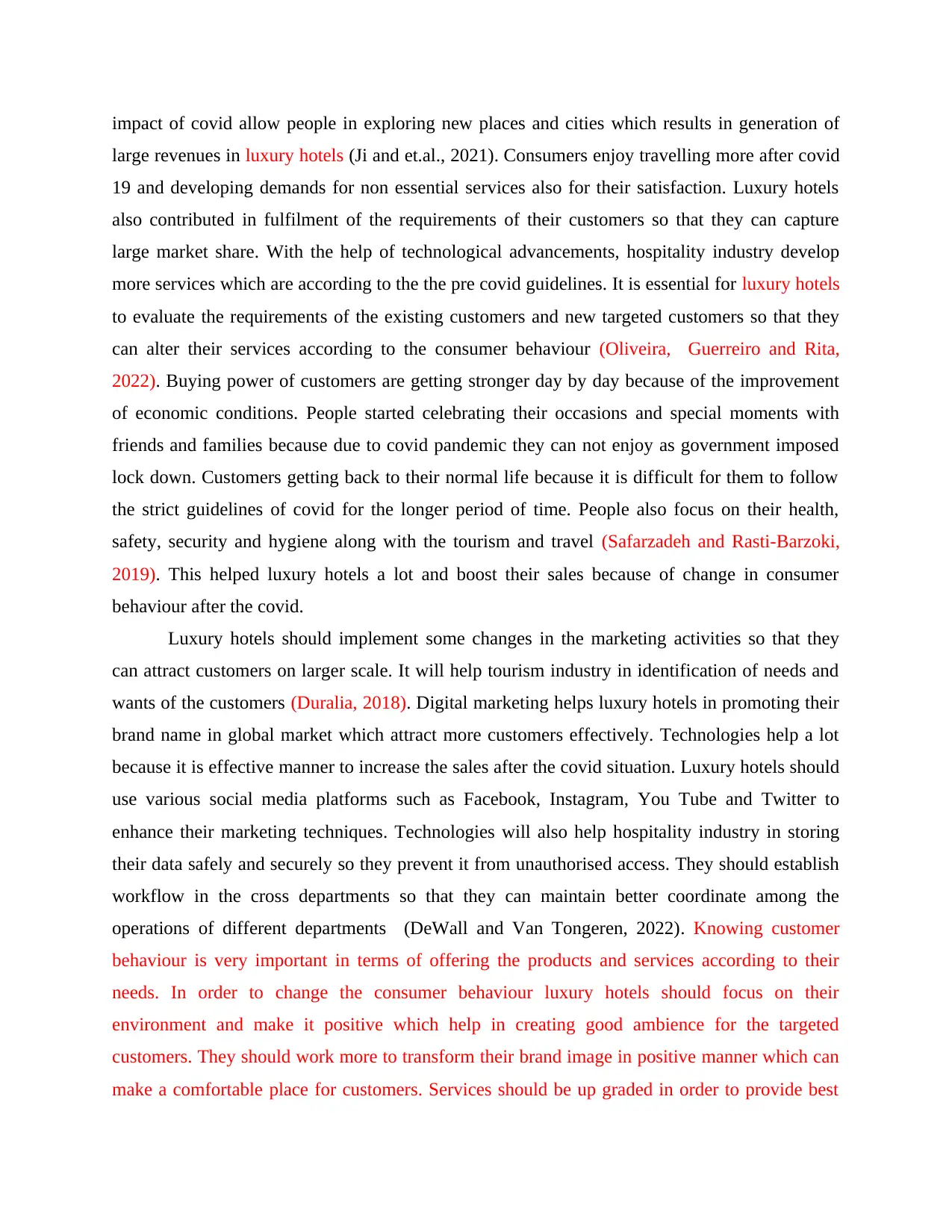
impact of covid allow people in exploring new places and cities which results in generation of
large revenues in luxury hotels (Ji and et.al., 2021). Consumers enjoy travelling more after covid
19 and developing demands for non essential services also for their satisfaction. Luxury hotels
also contributed in fulfilment of the requirements of their customers so that they can capture
large market share. With the help of technological advancements, hospitality industry develop
more services which are according to the the pre covid guidelines. It is essential for luxury hotels
to evaluate the requirements of the existing customers and new targeted customers so that they
can alter their services according to the consumer behaviour (Oliveira, Guerreiro and Rita,
2022). Buying power of customers are getting stronger day by day because of the improvement
of economic conditions. People started celebrating their occasions and special moments with
friends and families because due to covid pandemic they can not enjoy as government imposed
lock down. Customers getting back to their normal life because it is difficult for them to follow
the strict guidelines of covid for the longer period of time. People also focus on their health,
safety, security and hygiene along with the tourism and travel (Safarzadeh and Rasti-Barzoki,
2019). This helped luxury hotels a lot and boost their sales because of change in consumer
behaviour after the covid.
Luxury hotels should implement some changes in the marketing activities so that they
can attract customers on larger scale. It will help tourism industry in identification of needs and
wants of the customers (Duralia, 2018). Digital marketing helps luxury hotels in promoting their
brand name in global market which attract more customers effectively. Technologies help a lot
because it is effective manner to increase the sales after the covid situation. Luxury hotels should
use various social media platforms such as Facebook, Instagram, You Tube and Twitter to
enhance their marketing techniques. Technologies will also help hospitality industry in storing
their data safely and securely so they prevent it from unauthorised access. They should establish
workflow in the cross departments so that they can maintain better coordinate among the
operations of different departments (DeWall and Van Tongeren, 2022). Knowing customer
behaviour is very important in terms of offering the products and services according to their
needs. In order to change the consumer behaviour luxury hotels should focus on their
environment and make it positive which help in creating good ambience for the targeted
customers. They should work more to transform their brand image in positive manner which can
make a comfortable place for customers. Services should be up graded in order to provide best
large revenues in luxury hotels (Ji and et.al., 2021). Consumers enjoy travelling more after covid
19 and developing demands for non essential services also for their satisfaction. Luxury hotels
also contributed in fulfilment of the requirements of their customers so that they can capture
large market share. With the help of technological advancements, hospitality industry develop
more services which are according to the the pre covid guidelines. It is essential for luxury hotels
to evaluate the requirements of the existing customers and new targeted customers so that they
can alter their services according to the consumer behaviour (Oliveira, Guerreiro and Rita,
2022). Buying power of customers are getting stronger day by day because of the improvement
of economic conditions. People started celebrating their occasions and special moments with
friends and families because due to covid pandemic they can not enjoy as government imposed
lock down. Customers getting back to their normal life because it is difficult for them to follow
the strict guidelines of covid for the longer period of time. People also focus on their health,
safety, security and hygiene along with the tourism and travel (Safarzadeh and Rasti-Barzoki,
2019). This helped luxury hotels a lot and boost their sales because of change in consumer
behaviour after the covid.
Luxury hotels should implement some changes in the marketing activities so that they
can attract customers on larger scale. It will help tourism industry in identification of needs and
wants of the customers (Duralia, 2018). Digital marketing helps luxury hotels in promoting their
brand name in global market which attract more customers effectively. Technologies help a lot
because it is effective manner to increase the sales after the covid situation. Luxury hotels should
use various social media platforms such as Facebook, Instagram, You Tube and Twitter to
enhance their marketing techniques. Technologies will also help hospitality industry in storing
their data safely and securely so they prevent it from unauthorised access. They should establish
workflow in the cross departments so that they can maintain better coordinate among the
operations of different departments (DeWall and Van Tongeren, 2022). Knowing customer
behaviour is very important in terms of offering the products and services according to their
needs. In order to change the consumer behaviour luxury hotels should focus on their
environment and make it positive which help in creating good ambience for the targeted
customers. They should work more to transform their brand image in positive manner which can
make a comfortable place for customers. Services should be up graded in order to provide best
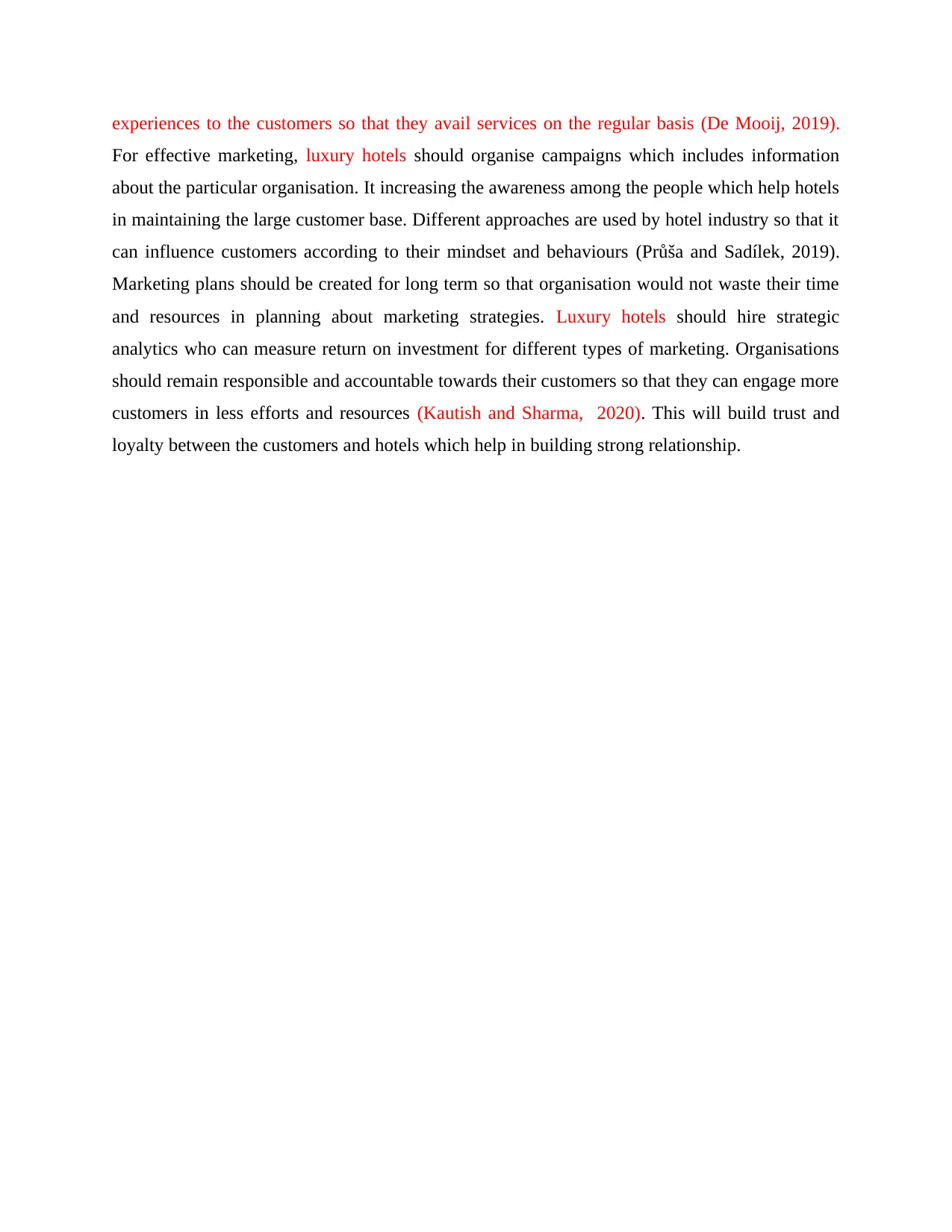
experiences to the customers so that they avail services on the regular basis (De Mooij, 2019).
For effective marketing, luxury hotels should organise campaigns which includes information
about the particular organisation. It increasing the awareness among the people which help hotels
in maintaining the large customer base. Different approaches are used by hotel industry so that it
can influence customers according to their mindset and behaviours (Průša and Sadílek, 2019).
Marketing plans should be created for long term so that organisation would not waste their time
and resources in planning about marketing strategies. Luxury hotels should hire strategic
analytics who can measure return on investment for different types of marketing. Organisations
should remain responsible and accountable towards their customers so that they can engage more
customers in less efforts and resources (Kautish and Sharma, 2020). This will build trust and
loyalty between the customers and hotels which help in building strong relationship.
For effective marketing, luxury hotels should organise campaigns which includes information
about the particular organisation. It increasing the awareness among the people which help hotels
in maintaining the large customer base. Different approaches are used by hotel industry so that it
can influence customers according to their mindset and behaviours (Průša and Sadílek, 2019).
Marketing plans should be created for long term so that organisation would not waste their time
and resources in planning about marketing strategies. Luxury hotels should hire strategic
analytics who can measure return on investment for different types of marketing. Organisations
should remain responsible and accountable towards their customers so that they can engage more
customers in less efforts and resources (Kautish and Sharma, 2020). This will build trust and
loyalty between the customers and hotels which help in building strong relationship.
⊘ This is a preview!⊘
Do you want full access?
Subscribe today to unlock all pages.

Trusted by 1+ million students worldwide
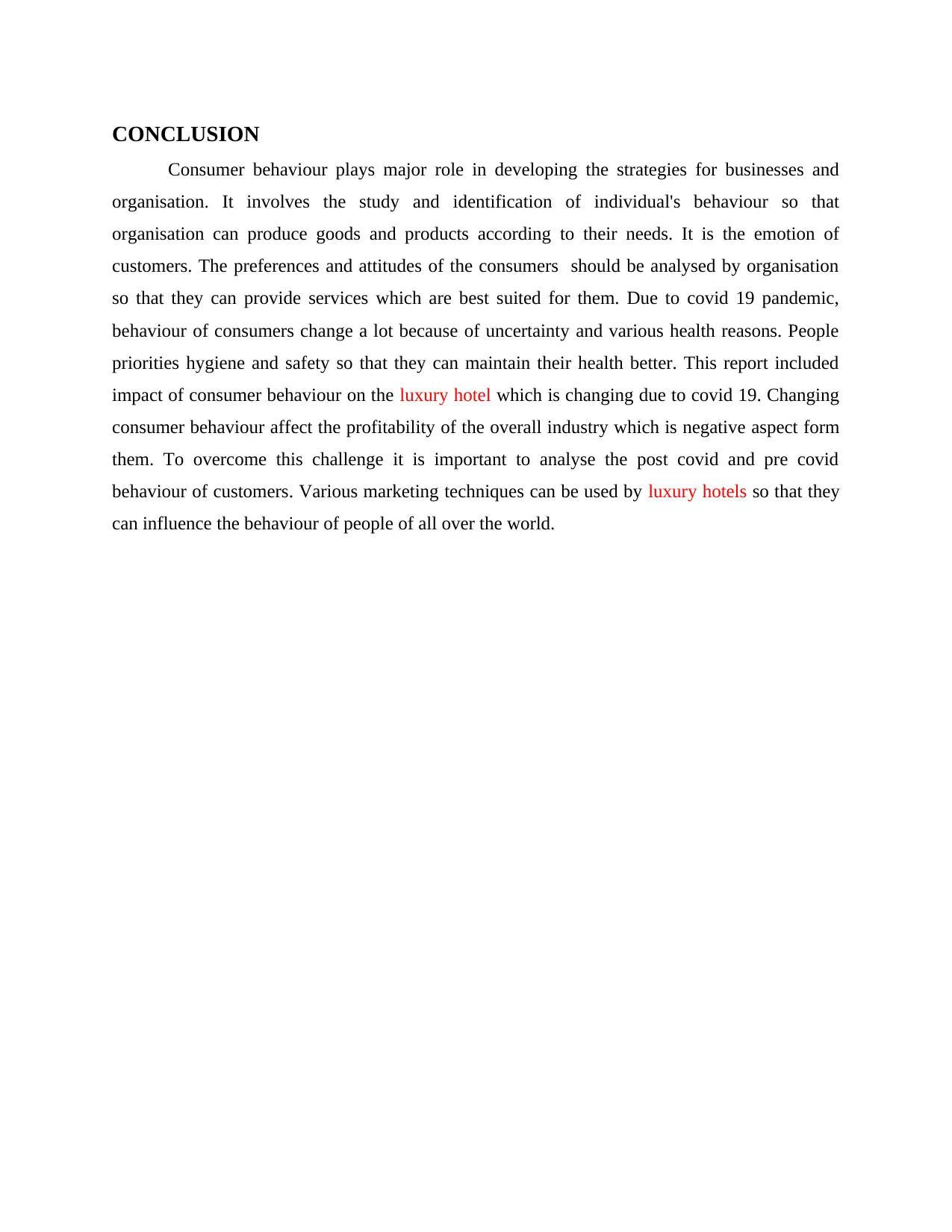
CONCLUSION
Consumer behaviour plays major role in developing the strategies for businesses and
organisation. It involves the study and identification of individual's behaviour so that
organisation can produce goods and products according to their needs. It is the emotion of
customers. The preferences and attitudes of the consumers should be analysed by organisation
so that they can provide services which are best suited for them. Due to covid 19 pandemic,
behaviour of consumers change a lot because of uncertainty and various health reasons. People
priorities hygiene and safety so that they can maintain their health better. This report included
impact of consumer behaviour on the luxury hotel which is changing due to covid 19. Changing
consumer behaviour affect the profitability of the overall industry which is negative aspect form
them. To overcome this challenge it is important to analyse the post covid and pre covid
behaviour of customers. Various marketing techniques can be used by luxury hotels so that they
can influence the behaviour of people of all over the world.
Consumer behaviour plays major role in developing the strategies for businesses and
organisation. It involves the study and identification of individual's behaviour so that
organisation can produce goods and products according to their needs. It is the emotion of
customers. The preferences and attitudes of the consumers should be analysed by organisation
so that they can provide services which are best suited for them. Due to covid 19 pandemic,
behaviour of consumers change a lot because of uncertainty and various health reasons. People
priorities hygiene and safety so that they can maintain their health better. This report included
impact of consumer behaviour on the luxury hotel which is changing due to covid 19. Changing
consumer behaviour affect the profitability of the overall industry which is negative aspect form
them. To overcome this challenge it is important to analyse the post covid and pre covid
behaviour of customers. Various marketing techniques can be used by luxury hotels so that they
can influence the behaviour of people of all over the world.
Paraphrase This Document
Need a fresh take? Get an instant paraphrase of this document with our AI Paraphraser
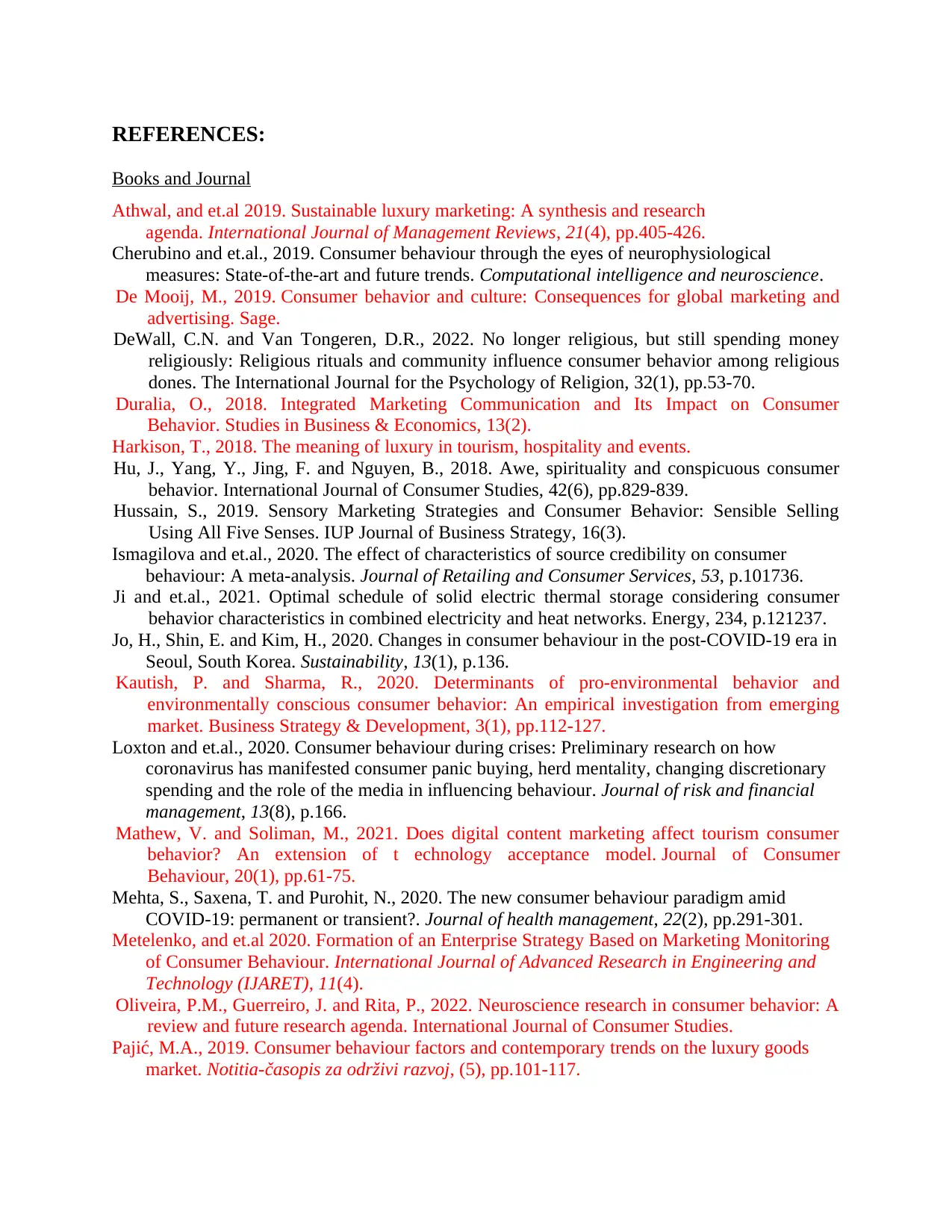
REFERENCES:
Books and Journal
Athwal, and et.al 2019. Sustainable luxury marketing: A synthesis and research
agenda. International Journal of Management Reviews, 21(4), pp.405-426.
Cherubino and et.al., 2019. Consumer behaviour through the eyes of neurophysiological
measures: State-of-the-art and future trends. Computational intelligence and neuroscience.
De Mooij, M., 2019. Consumer behavior and culture: Consequences for global marketing and
advertising. Sage.
DeWall, C.N. and Van Tongeren, D.R., 2022. No longer religious, but still spending money
religiously: Religious rituals and community influence consumer behavior among religious
dones. The International Journal for the Psychology of Religion, 32(1), pp.53-70.
Duralia, O., 2018. Integrated Marketing Communication and Its Impact on Consumer
Behavior. Studies in Business & Economics, 13(2).
Harkison, T., 2018. The meaning of luxury in tourism, hospitality and events.
Hu, J., Yang, Y., Jing, F. and Nguyen, B., 2018. Awe, spirituality and conspicuous consumer
behavior. International Journal of Consumer Studies, 42(6), pp.829-839.
Hussain, S., 2019. Sensory Marketing Strategies and Consumer Behavior: Sensible Selling
Using All Five Senses. IUP Journal of Business Strategy, 16(3).
Ismagilova and et.al., 2020. The effect of characteristics of source credibility on consumer
behaviour: A meta-analysis. Journal of Retailing and Consumer Services, 53, p.101736.
Ji and et.al., 2021. Optimal schedule of solid electric thermal storage considering consumer
behavior characteristics in combined electricity and heat networks. Energy, 234, p.121237.
Jo, H., Shin, E. and Kim, H., 2020. Changes in consumer behaviour in the post-COVID-19 era in
Seoul, South Korea. Sustainability, 13(1), p.136.
Kautish, P. and Sharma, R., 2020. Determinants of pro‐environmental behavior and
environmentally conscious consumer behavior: An empirical investigation from emerging
market. Business Strategy & Development, 3(1), pp.112-127.
Loxton and et.al., 2020. Consumer behaviour during crises: Preliminary research on how
coronavirus has manifested consumer panic buying, herd mentality, changing discretionary
spending and the role of the media in influencing behaviour. Journal of risk and financial
management, 13(8), p.166.
Mathew, V. and Soliman, M., 2021. Does digital content marketing affect tourism consumer
behavior? An extension of t echnology acceptance model. Journal of Consumer
Behaviour, 20(1), pp.61-75.
Mehta, S., Saxena, T. and Purohit, N., 2020. The new consumer behaviour paradigm amid
COVID-19: permanent or transient?. Journal of health management, 22(2), pp.291-301.
Metelenko, and et.al 2020. Formation of an Enterprise Strategy Based on Marketing Monitoring
of Consumer Behaviour. International Journal of Advanced Research in Engineering and
Technology (IJARET), 11(4).
Oliveira, P.M., Guerreiro, J. and Rita, P., 2022. Neuroscience research in consumer behavior: A
review and future research agenda. International Journal of Consumer Studies.
Pajić, M.A., 2019. Consumer behaviour factors and contemporary trends on the luxury goods
market. Notitia-časopis za održivi razvoj, (5), pp.101-117.
Books and Journal
Athwal, and et.al 2019. Sustainable luxury marketing: A synthesis and research
agenda. International Journal of Management Reviews, 21(4), pp.405-426.
Cherubino and et.al., 2019. Consumer behaviour through the eyes of neurophysiological
measures: State-of-the-art and future trends. Computational intelligence and neuroscience.
De Mooij, M., 2019. Consumer behavior and culture: Consequences for global marketing and
advertising. Sage.
DeWall, C.N. and Van Tongeren, D.R., 2022. No longer religious, but still spending money
religiously: Religious rituals and community influence consumer behavior among religious
dones. The International Journal for the Psychology of Religion, 32(1), pp.53-70.
Duralia, O., 2018. Integrated Marketing Communication and Its Impact on Consumer
Behavior. Studies in Business & Economics, 13(2).
Harkison, T., 2018. The meaning of luxury in tourism, hospitality and events.
Hu, J., Yang, Y., Jing, F. and Nguyen, B., 2018. Awe, spirituality and conspicuous consumer
behavior. International Journal of Consumer Studies, 42(6), pp.829-839.
Hussain, S., 2019. Sensory Marketing Strategies and Consumer Behavior: Sensible Selling
Using All Five Senses. IUP Journal of Business Strategy, 16(3).
Ismagilova and et.al., 2020. The effect of characteristics of source credibility on consumer
behaviour: A meta-analysis. Journal of Retailing and Consumer Services, 53, p.101736.
Ji and et.al., 2021. Optimal schedule of solid electric thermal storage considering consumer
behavior characteristics in combined electricity and heat networks. Energy, 234, p.121237.
Jo, H., Shin, E. and Kim, H., 2020. Changes in consumer behaviour in the post-COVID-19 era in
Seoul, South Korea. Sustainability, 13(1), p.136.
Kautish, P. and Sharma, R., 2020. Determinants of pro‐environmental behavior and
environmentally conscious consumer behavior: An empirical investigation from emerging
market. Business Strategy & Development, 3(1), pp.112-127.
Loxton and et.al., 2020. Consumer behaviour during crises: Preliminary research on how
coronavirus has manifested consumer panic buying, herd mentality, changing discretionary
spending and the role of the media in influencing behaviour. Journal of risk and financial
management, 13(8), p.166.
Mathew, V. and Soliman, M., 2021. Does digital content marketing affect tourism consumer
behavior? An extension of t echnology acceptance model. Journal of Consumer
Behaviour, 20(1), pp.61-75.
Mehta, S., Saxena, T. and Purohit, N., 2020. The new consumer behaviour paradigm amid
COVID-19: permanent or transient?. Journal of health management, 22(2), pp.291-301.
Metelenko, and et.al 2020. Formation of an Enterprise Strategy Based on Marketing Monitoring
of Consumer Behaviour. International Journal of Advanced Research in Engineering and
Technology (IJARET), 11(4).
Oliveira, P.M., Guerreiro, J. and Rita, P., 2022. Neuroscience research in consumer behavior: A
review and future research agenda. International Journal of Consumer Studies.
Pajić, M.A., 2019. Consumer behaviour factors and contemporary trends on the luxury goods
market. Notitia-časopis za održivi razvoj, (5), pp.101-117.
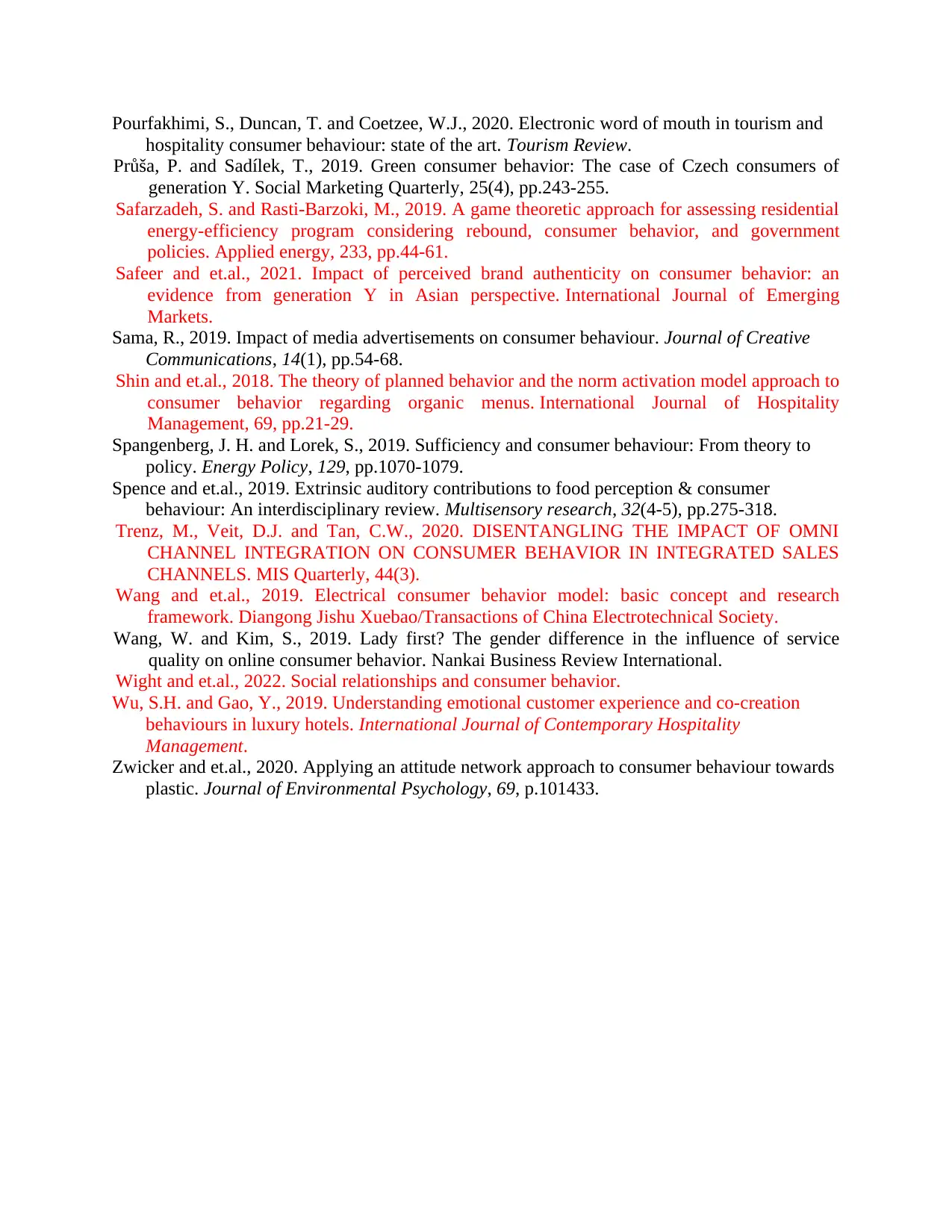
Pourfakhimi, S., Duncan, T. and Coetzee, W.J., 2020. Electronic word of mouth in tourism and
hospitality consumer behaviour: state of the art. Tourism Review.
Průša, P. and Sadílek, T., 2019. Green consumer behavior: The case of Czech consumers of
generation Y. Social Marketing Quarterly, 25(4), pp.243-255.
Safarzadeh, S. and Rasti-Barzoki, M., 2019. A game theoretic approach for assessing residential
energy-efficiency program considering rebound, consumer behavior, and government
policies. Applied energy, 233, pp.44-61.
Safeer and et.al., 2021. Impact of perceived brand authenticity on consumer behavior: an
evidence from generation Y in Asian perspective. International Journal of Emerging
Markets.
Sama, R., 2019. Impact of media advertisements on consumer behaviour. Journal of Creative
Communications, 14(1), pp.54-68.
Shin and et.al., 2018. The theory of planned behavior and the norm activation model approach to
consumer behavior regarding organic menus. International Journal of Hospitality
Management, 69, pp.21-29.
Spangenberg, J. H. and Lorek, S., 2019. Sufficiency and consumer behaviour: From theory to
policy. Energy Policy, 129, pp.1070-1079.
Spence and et.al., 2019. Extrinsic auditory contributions to food perception & consumer
behaviour: An interdisciplinary review. Multisensory research, 32(4-5), pp.275-318.
Trenz, M., Veit, D.J. and Tan, C.W., 2020. DISENTANGLING THE IMPACT OF OMNI
CHANNEL INTEGRATION ON CONSUMER BEHAVIOR IN INTEGRATED SALES
CHANNELS. MIS Quarterly, 44(3).
Wang and et.al., 2019. Electrical consumer behavior model: basic concept and research
framework. Diangong Jishu Xuebao/Transactions of China Electrotechnical Society.
Wang, W. and Kim, S., 2019. Lady first? The gender difference in the influence of service
quality on online consumer behavior. Nankai Business Review International.
Wight and et.al., 2022. Social relationships and consumer behavior.
Wu, S.H. and Gao, Y., 2019. Understanding emotional customer experience and co-creation
behaviours in luxury hotels. International Journal of Contemporary Hospitality
Management.
Zwicker and et.al., 2020. Applying an attitude network approach to consumer behaviour towards
plastic. Journal of Environmental Psychology, 69, p.101433.
hospitality consumer behaviour: state of the art. Tourism Review.
Průša, P. and Sadílek, T., 2019. Green consumer behavior: The case of Czech consumers of
generation Y. Social Marketing Quarterly, 25(4), pp.243-255.
Safarzadeh, S. and Rasti-Barzoki, M., 2019. A game theoretic approach for assessing residential
energy-efficiency program considering rebound, consumer behavior, and government
policies. Applied energy, 233, pp.44-61.
Safeer and et.al., 2021. Impact of perceived brand authenticity on consumer behavior: an
evidence from generation Y in Asian perspective. International Journal of Emerging
Markets.
Sama, R., 2019. Impact of media advertisements on consumer behaviour. Journal of Creative
Communications, 14(1), pp.54-68.
Shin and et.al., 2018. The theory of planned behavior and the norm activation model approach to
consumer behavior regarding organic menus. International Journal of Hospitality
Management, 69, pp.21-29.
Spangenberg, J. H. and Lorek, S., 2019. Sufficiency and consumer behaviour: From theory to
policy. Energy Policy, 129, pp.1070-1079.
Spence and et.al., 2019. Extrinsic auditory contributions to food perception & consumer
behaviour: An interdisciplinary review. Multisensory research, 32(4-5), pp.275-318.
Trenz, M., Veit, D.J. and Tan, C.W., 2020. DISENTANGLING THE IMPACT OF OMNI
CHANNEL INTEGRATION ON CONSUMER BEHAVIOR IN INTEGRATED SALES
CHANNELS. MIS Quarterly, 44(3).
Wang and et.al., 2019. Electrical consumer behavior model: basic concept and research
framework. Diangong Jishu Xuebao/Transactions of China Electrotechnical Society.
Wang, W. and Kim, S., 2019. Lady first? The gender difference in the influence of service
quality on online consumer behavior. Nankai Business Review International.
Wight and et.al., 2022. Social relationships and consumer behavior.
Wu, S.H. and Gao, Y., 2019. Understanding emotional customer experience and co-creation
behaviours in luxury hotels. International Journal of Contemporary Hospitality
Management.
Zwicker and et.al., 2020. Applying an attitude network approach to consumer behaviour towards
plastic. Journal of Environmental Psychology, 69, p.101433.
⊘ This is a preview!⊘
Do you want full access?
Subscribe today to unlock all pages.

Trusted by 1+ million students worldwide
1 out of 12
Related Documents
Your All-in-One AI-Powered Toolkit for Academic Success.
+13062052269
info@desklib.com
Available 24*7 on WhatsApp / Email
![[object Object]](/_next/static/media/star-bottom.7253800d.svg)
Unlock your academic potential
Copyright © 2020–2026 A2Z Services. All Rights Reserved. Developed and managed by ZUCOL.




